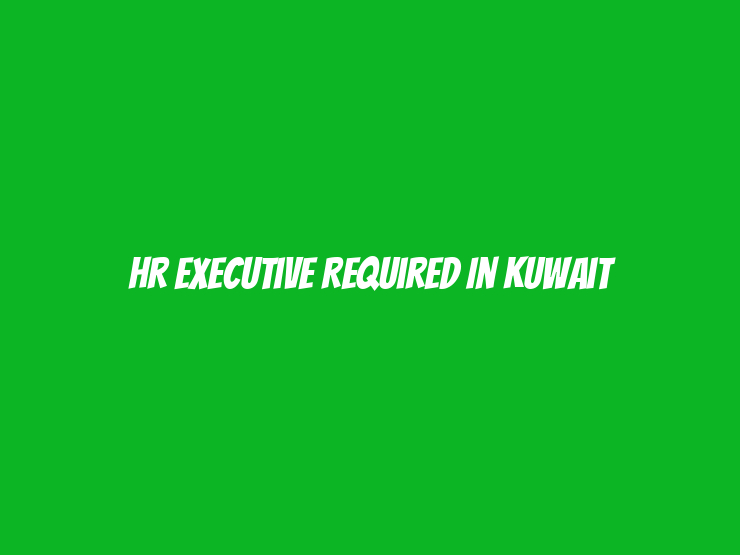An HR Executive plays a key role in managing an organization’s human resources functions, ensuring that the company attracts, develops, and retains talent while fostering a positive work environment. They are responsible for overseeing recruitment, employee relations, performance management, and compliance with labor laws. HR Executives also work closely with management to align HR strategies with organizational goals, supporting the company’s growth and development through effective human resource planning and management.
| Salary | Market Competitive |
| Experience | 2 years |
| Location | Kuwait |
| Qualification | Bachelor Degree |
| Posted | 19 October 2024 |
| Job Type | Full-Time |
| Posted by | Habeebi Recruiter |
| last date to apply | apply within 15 days |
Key Responsibilities
1. Recruitment and Talent Acquisition
One of the primary responsibilities of an HR Executive is managing the recruitment process. This involves identifying staffing needs, creating job descriptions, advertising open positions, and screening candidates. The HR Executive conducts interviews, shortlists candidates, and coordinates with department heads to ensure the best fit for the organization. Additionally, they work to build a pipeline of talent, ensuring the company has access to qualified candidates as business needs arise. A successful HR Executive will also focus on employer branding to attract top talent.
2. Employee Onboarding and Training
Once new employees are hired, the HR Executive manages their onboarding process to ensure a smooth transition into the company. This includes introducing them to company policies, ensuring they complete necessary documentation, and familiarizing them with their roles. HR Executives may also coordinate training programs, either in-house or through external providers, to help employees develop new skills and improve their performance. Continuous professional development is key to maintaining a skilled and motivated workforce, and the HR Executive plays a central role in designing and implementing these programs.
3. Managing Employee Relations
HR Executives are responsible for maintaining positive employee relations, acting as a liaison between management and staff. They address employee concerns, mediate conflicts, and ensure that issues are resolved fairly and in line with company policies. By fostering open communication and maintaining a supportive work environment, HR Executives help improve employee satisfaction and retention. They also ensure that employees understand their rights and responsibilities within the workplace.
4. Performance Management and Appraisals
The HR Executive is involved in managing the performance appraisal process, helping to set clear performance metrics, providing guidance on goals, and facilitating regular reviews. This involves working with managers to ensure that employee evaluations are conducted fairly and consistently. HR Executives may also be involved in developing performance improvement plans for underperforming employees, ensuring that they receive the support and feedback needed to succeed. By maintaining an effective performance management system, HR Executives help boost productivity and align employee efforts with organizational objectives.
5. Compensation and Benefits Management
HR Executives oversee the company’s compensation and benefits programs to ensure that employees are fairly rewarded for their work. This includes managing payroll, administering employee benefits such as health insurance and retirement plans, and conducting salary reviews to maintain competitiveness in the job market. HR Executives work to ensure that compensation packages are aligned with industry standards and company policies while maintaining cost-effectiveness for the organization.
6. Ensuring Compliance with Labor Laws
A critical responsibility of an HR Executive is ensuring that the company complies with all labor laws and regulations. This includes managing employee contracts, monitoring working hours, and ensuring compliance with health and safety regulations. HR Executives must stay up-to-date with changes in employment law and ensure that the organization’s policies and practices adhere to these standards. They are also responsible for conducting audits and investigations to address any potential violations or concerns regarding compliance.
7. Employee Engagement and Retention
To maintain a motivated and engaged workforce, HR Executives are involved in designing and implementing employee engagement initiatives. This could include organizing team-building activities, recognizing employee achievements, and promoting a healthy work-life balance. HR Executives play a crucial role in understanding employee needs and concerns, which in turn helps in developing strategies to reduce turnover and improve retention rates. Their efforts in fostering a positive work environment directly contribute to the company’s overall success.
Skills and Qualifications
To excel as an HR Executive, a combination of soft skills, technical HR knowledge, and industry experience is essential. Key skills and qualifications include:
- HR Knowledge: In-depth understanding of HR processes, labor laws, and best practices.
- Communication Skills: Strong verbal and written communication for interacting with employees and management.
- Conflict Resolution: Ability to mediate and resolve disputes effectively.
- Organizational Skills: Managing multiple tasks, from recruitment to performance evaluations, efficiently.
- Interpersonal Skills: Building strong relationships with employees and fostering a positive work environment.
- Analytical Skills: Evaluating data related to employee performance, satisfaction, and compensation.
- Problem-Solving Abilities: Addressing and resolving HR-related challenges quickly and effectively.
Conclusion
An HR Executive is crucial to the effective management of an organization’s human capital. By overseeing recruitment, performance management, employee relations, and compliance, they help ensure that the workforce is motivated, skilled, and aligned with the company’s goals. Through strategic HR practices, they contribute to creating a productive and positive work environment, which in turn supports the overall success and growth of the organization.
How to apply:
Send your updated resume to our email or directly reach us at our phone:
Email: hr@kht-kwg.com
Phone: +965 9915 6739

